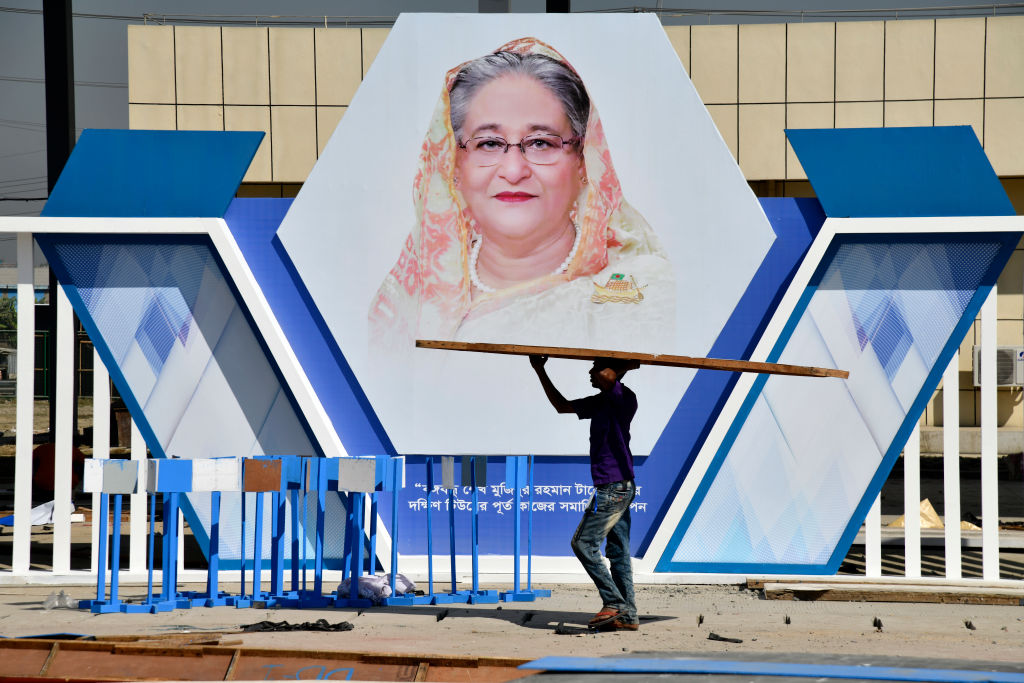
Strategically located as a link between South Asia and the rest of the Indo-Pacific, Bangladesh has emerged as a highly sought-after partner in the region’s ever-changing geopolitical landscape. It is a willing participant in China’s ambitious project Belt and Road Initiative, but Dhaka’s new Indo-Pacific policy emphasises neutrality and achieving close economic engagement with both China and the US. The struggle for influence between these rivals has forced emerging economies like Bangladesh into a delicate balancing act.
But in an intriguing development, Bangladesh is now on the verge of joining BRICS, an influential global south bloc currently made up of Brazil, Russia, India, China and South Africa.
Bangladesh’s interest in BRICS has substantial geopolitical implications, especially considering the state of relations between Dhaka and Washington in recent years. Since coming to power in 2009, Bangladesh’s Prime Minister Sheikh Hasina and her government have faced vocal US criticism over human rights issues and the controversial 2014 and 2018 elections. In 2021, the US imposed sanctions on Bangladesh’s elite paramilitary force, accusing it of extrajudicial killings, enforced disappearances and human rights violations. In the same year, US President Joe Biden did not include Bangladesh in his 110-country-strong Summit for Democracy.
In May this year, US Secretary of State Antony Blinken announced a new visa policy to ‘promote democratic elections in Bangladesh’. Under this policy, the US can restrict visas for individuals it believes are responsible for undermining the democratic election process in Bangladesh. Perhaps predictably, Bangladesh’s government opposes the policy and the opposition party is in favour of it.
In response, one influential parliamentarian in Bangladesh claimed that the US was seeking control over the strategically important Saint Martin Island, and Hasina has alluded to a regime-change conspiracy, musing that ‘maybe the US doesn’t want me in power’.
Most recently, the US joined with a dozen other Western countries in issuing a statement condemning the violence that broke out last month following a brutal attack on an independent candidate, Ashraful Alom, who had stood against the ruling party candidate in a by-election. Dhaka responded by summoning the US and other nations’ ambassadors for an explanation, saying they had shown an ‘undiplomatic attitude’.
Despite these challenges in the relationship, Washington has been consistently seeking Bangladesh’s involvement in the US Indo-Pacific strategy. Bangladesh’s announcement of its interest in BRICS would seem to foil those efforts.
China, meanwhile, has seized the opportunity to demonstrate its unwavering support for the current regime. While promoting democracy in an avowedly democratic country may not be unfair, China’s newly appointed ambassador to Dhaka, Yao Wen, felt it necessary to write a column criticising US concerns about democracy in Bangladesh. A Chinese foreign ministry spokesperson then accused the US of meddling in Bangladesh’s internal affairs under the pretext of democracy and human rights, and affirmed China’s readiness to work with Bangladesh to oppose ‘power politics’.
Hasina is scheduled to participate in the BRICS summit in South Africa this month, where it’s expected that Bangladesh and several other emerging economies will gain membership. In September, the prime minister will visit India for the G20 summit as a special guest.
In the current regional context, Bangladesh’s inclusion in BRICS may be seen as an implicit rejection of the US and its Indo-Pacific strategy. At the same time, it can be seen as the product of a natural evolution of the warm relations the regime has enjoyed with BRICS nations since coming to power.
Bangladesh’s next elections are scheduled to be held by January 2024. The opposition in Bangladesh has raised objections to the electoral system and is demanding a non-partisan government system during elections. However, the government hasn’t addressed these demands.
With Bangladesh engaged in multibillion-dollar projects with China, Japan, India and Russia, it is reasonable to speculate that the progress of some of those projects may be influenced by a change in government. Consequently, many of the world’s major powers will be closely monitoring the upcoming elections in Bangladesh. Recent regime changes in South Asian countries like Pakistan and Sri Lanka have demonstrated the involvement of geopolitics. Similarly, in 2018, China and the United States were engaged in rhetorical jostling around national elections in Maldives.
With its refusal to address opposition demands and so much controversy surrounding the last two elections, it seems unlikely that the regime can avoid further criticism in the forthcoming election. Another disputed election in Bangladesh could jeopardise the current regime and its drift away from the US as an expected member of BRICS.
The world should continue to watch events in Bangladesh closely. What takes place in this crucial buffer zone in the Indo-Pacific over the next several months will have implications across the globe.

